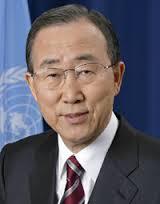Dear Secretary-General,
On World Toilet Day, 19 November, we the undersigned are writing to you on behalf of the 2.5 billion people who face a daily health crisis. When they wake each day they are unable to do what we take for granted: relieve themselves in a clean, safe toilet.
In the developing world, over 1,400 children under the age of five will die today of a diarrhoeal disease simply because they and their families do not have access to clean drinking water, a basic toilet or a safe way to deal with human waste. Nor do they have sufficient water to keep their hands and bodies clean. We know that you share our grave concern on this critical issue.
This crisis touches the lives of hundreds of millions of children, from birth to adulthood, if they are lucky enough to make it that far. Undernutrition, linked to chronic diarrhoeal illness, is estimated to have stunted the development of around 162 million children, often leaving a lifelong legacy of poverty and ill-health. Diarrhoea also significantly contributes to acute malnutrition, a condition which is estimated to kill one million children every year. To make matters worse, health professionals are often expected to deliver quality healthcare in unhygienic facilities that lack basic sanitation and clean water, putting patients’ lives at risk.
As you know, the impact of poor sanitation goes beyond health. One in three women and girls around the world do not have access to basic toilets and risk their safety every time they must find a place to relieve themselves. Girls who attend schools without safe, private, separate toilets are more likely to drop out during puberty, depriving themselves of the education that can help break the cycle of poverty.
The British Medical Journal has identified sanitation as the most important invention in the past 150 years, more critical than antibiotics and immunisations. Yet, of the UN’s existing Millennium Development Goals, the target for sanitation remains one of the most off-track. An estimated ten million children have died from diarrhoeal diseases in the years since the goals were launched.
We have a moment now to change this. You can change this.
As the UN shapes the forthcoming Sustainable Development Goals, this needless tragedy can be ended by ensuring the poorest people in the world get access to safe water, sanitation and improved hygiene.
We call on you to lead the world to a future of better health, dignity and prosperity for all by championing a dedicated goal to deliver water and sanitation to everyone, everywhere by 2030.
Yours sincerely,
Dr Teguest Guerma, Director General, Amref Health Africa
















